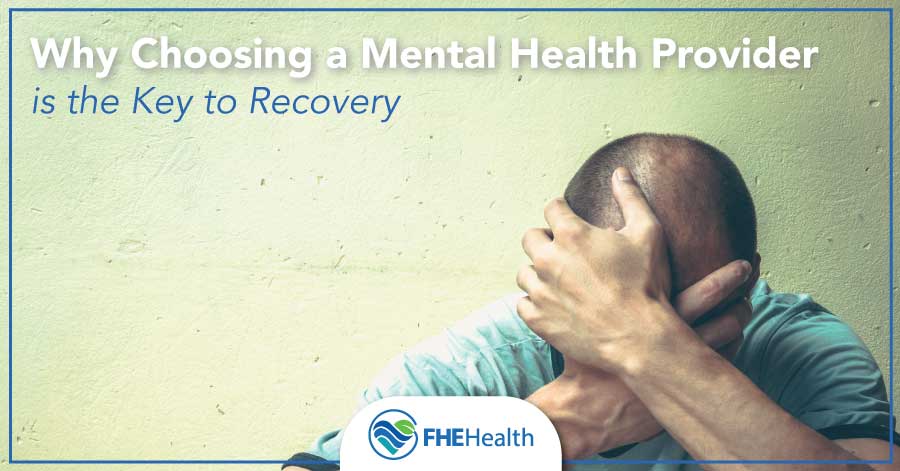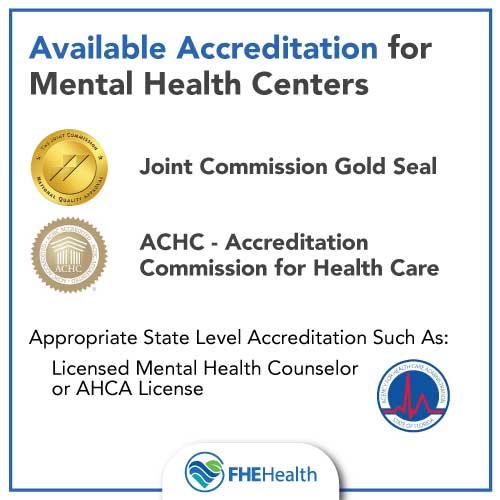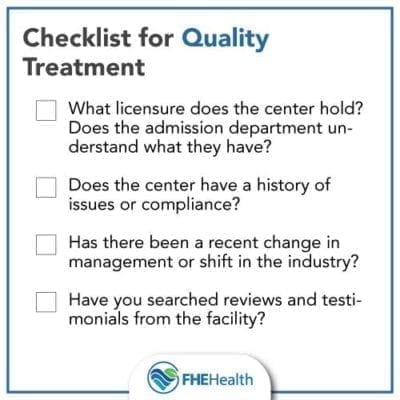
When choosing inpatient mental health, there are numerous factors to look at and compare to determine which location is the best fit for your needs. Many people look to accreditation as the gold standard, but it’s not the full view on the quality of care received or the likely outcomes the location can provide.
Safety Violations at Accredited Locations Should Be Eye-Opening
A recent Wall Street Journal article provides a true eye-opening read for anyone seeking help through an accredited mental health location. Its study found over 100 psychiatric hospitals that had received accreditation from The Joint Commission and yet had several serious safety violations. Some of those concerns lead to sexual assault and other forms of abuse or even death.
 It’s important to note that accreditation is vitally important. It’s not the only piece to the selection process, but it remains one key component. The Joint Commission is the only accrediting organization in the U.S. with federal approval to provide accreditation for psychiatric hospitals that accept Medicare.
It’s important to note that accreditation is vitally important. It’s not the only piece to the selection process, but it remains one key component. The Joint Commission is the only accrediting organization in the U.S. with federal approval to provide accreditation for psychiatric hospitals that accept Medicare.
What does this report show? The Wall Street Journal article points to some startling facts. First, it found that the organization only revoked or denied 1% of the psychiatric hospitals it oversaw for the years 2014 and 2015. However, when state inspectors visited the same institutions, they found 16% of them had violations significant enough to put their federal funding at risk.
The violations reported by the article are numerous. For example, some included failure to provide a person with insulin and administering psychotropic medications without the patient’s consent. Another location was reprimanded for a staff member using a personal phone to take photos of a patient’s breasts, among other incidents.
How can this happen? And, does that mean these types of events happen in all locations? The answer to these questions is no, this isn’t normal, but it can happen even at an accredited location. That’s the biggest reason for you to take the time to truly learn as much as you can about the location you plan to turn to for help.
What Accreditations Do Mental Health Providers Typically Have?
When seeking inpatient mental health help, you want to know that the provider has the tools and resources to truly help you through your symptoms. Accreditation, then, is one component of this. To provide services to members, the Centers for Medicare & Medicaid Services say the organization must be accredited by the American Osteopathic Association and the Joint Commission on Accreditation of Hospital Organizations. States have different accreditation requirements as well.
Here are some of the major accreditations you may see and what they mean.
The Joint Commission
This is a nonprofit organization that works to certify and accredit the 21,000 health care providers in the U.S. To do this, it evaluates organizations based on how they handle patients, track the progress of patients and provide treatments. It also monitors treatment outcomes.
American Osteopathic Association
This organization, frequently called AOA, represents 137,000 osteopathic doctors and medical students. It also oversees their training. Its goal is to ensure the physicians providing care are providing the best care according to industry standards.
ACHC Behavioral Health
This type of accreditation is for health care providers in the field. It aims to ensure patients receive the best quality of care, sets standards developed specifically for this type of behavioral health location and then ensures business operations run accordingly.
The Utilization Review Accreditation Commission
URAC is a nonprofit organization that promotes health care in rehabilitation settings through a comprehensive accreditation program. This organization’s process is a bit more in-depth, requiring various goals to be met on a consistent basis rather than using a checkoff list like most accrediting organizations. Still, like all accrediting bodies, it looks for insight into how business operations run, how patients receive care, staffing and cleanliness.
It’s All So Vague
It’s clear that accreditation seems like a good thing, but it’s not always clear what having this stamp of approval means. Unfortunately, many organizations provide only basic guidelines in terms of what they look for and how they monitor locations. The best organizations commit to ensuring any member organization accepts the values the accrediting organization sets. If you’re in line with those values, you can expect for the location to meet at least those goals.
If you are specifically interested in any accrediting body, contact them. Ask questions. Request more information about the location you are considering using, too. Most are willing to share available data with you.
The Loopholes in Accreditations
 To be clear, accreditations are important. At FHE Health, we maintain the best of them as well. Yet there are some limitations in terms of what accrediting bodies can do.
To be clear, accreditations are important. At FHE Health, we maintain the best of them as well. Yet there are some limitations in terms of what accrediting bodies can do.
Every location providing care like this can have accidents or problems occur. These one-time events can seem terrifying to you as a patient considering their service. The key to look for is the frequency and why things happen. Loopholes are one way accreditations can sometimes be misleading.
For example, most of the time, if an accrediting body enters a location, it is an unannounced visit, or with little warning. That means it’s more than likely to catch people acting the way they normally do. When something is observed that’s not done properly, a violation is issued. What you may not realize is that most locations have a 30-day or several-month window in which they can fix those problems before further action is taken. In some cases, the list of recommendations that must be completed are followed up on via a self-survey.
In some organizations, change is a key factor as well. For example, a change in ownership of the location or falling profits due to changes in the local economy can impact these facilities. Others struggle with staffing from time to time. When change occurs, there may be gaps in the amount of inspections done. In other cases, there will be more leeway for the new owner to make changes. This can create a misleading point of view for you.
What Should You Do, Then, When Seeking Certified Mental Health Care?
It all seems very worrisome and may have you feeling like you can’t trust any location. That’s not the case. Accredited mental health counseling is a good starting point. Learn which accreditations the organization holds. Then, contact that organization or otherwise research them to find out what specific violations the center has had in the last few years. Are these common or ongoing problems? Are they drastic concerns or factors with less of an impact on the patient?
Then, learn more about the location. Visit unexpectedly to find out what’s happening. Learn the location’s reputation by researching it online. Speak to former patients and ask if they would recommend the facility. The more information you gather on your own, the more comfortable you can feel making the decision about where to receive your care.
FHE Health Offers the Accredited, Solid-Reputation Service You Need
Your needs for a qualified mental health provider can be met when you work with our team at FHE Health. Our compassionate, trusted counselors are available to speak to you 24/7 about your admission into our programs. Contact us today at (833) 596-3502 to learn more about the care we can offer you.






